James Harding
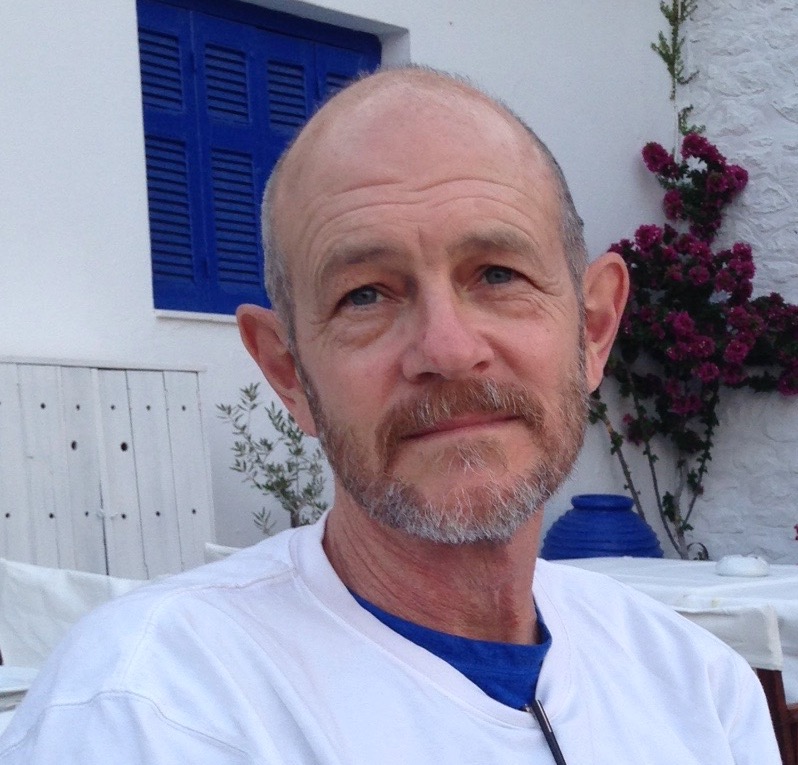
Professor, Theatre Scholarship and Performance Studies
School of Theatre, Dance, and Performance Studies
jharding@umd.edu
2822 The Clarice Smith Performing Arts Center
Get Directions
Research Expertise
Performance Studies
Theatre History
James M. Harding is an internationally known scholar whose work focuses on political activism and the arts, the history of experimental theatre, theatre in the 1960s, post 9/11 theatre and performance, the intersection of surveillance and performance, and on performance studies more generally. His most recent monograph is entitled Performance, Transparency and the Cultures of Surveillance (Michigan, 2018). He is the author of three previous monographs: The Ghosts of the Avant-Garde(s): Exorcising Experimental Theatre and Performance (Michigan, 2013), Cutting Performances: Collage Events, Feminist Artists and the American Avant-Garde (Michigan, 2010), and Adorno and "A Writing of the Ruins": Essays on Modern Aesthetics and Anglo-American Literature and Culture (SUNY, 1997). He has co-edited five anthologies, the most recent of which is entitled The Sixties, Center Stage: Mainstream and Popular Performances in a Turbulent Decade (Michigan, 2017). His articles have appeared in Performing Arts Journal, TDR, Performance International, Theatre Journal, Theatre Survey, Modern Drama, and PMLA as well as in numerous anthologies. In 2017, Harding received the year’s “Outstand Article Award” from American Theatre in Higher Education for his article “Incendiary Acts and Apocryphal Avant-Gardes: Thích Quảng Ðức, Self-Immolation, and Buddhist Spiritual Vanguardism” (PAJ, 2017). During the 2016-2017 academic year, he was a research fellow at the Freie Universität, Berlin’s International Research Center / “Interweaving Performance Cultures” working on a new monograph tentatively entitled, Performance Beyond the Pale: Radical Acts and Bodies in Extremis.
Harding is proud to be a Maryland alumnus, having completed his Ph.D. in Comparative Literature in 1991 at College Park. Before joining the faculty at Maryland, he was Professor of Theatre and Performance Studies at the University of Warwick, UK, was twice a Visiting Professor at the Insitut für Theaterwissenschaft at the Freie Universität, Berlin, and was Professor of English at the University of Mary Washington in Fredericksburg, VA.
Education / Training:
- Ph.D., Comparative Literature, University of Maryland, 1991
- M.A., English / Comparative Literature, San Diego State University, 1987
- B.A., German Literature, University of Texas, 1982
Areas of Specialization:
Modern and Contemporary Performance, Experimental Theatre and Performance, History of the Theatrical Avant-Garde, Theatre of the 1960s, Post-9/11 Theatre and Performance, Critical Theory, Performance Studies, and Surveillance Studies.
Professional Affiliations:
- American Society for Theatre Research (ASTR)
- Association for Theatre in Higher Education (ATHE)
- Performance Studies International (PSi)
- International Federation for Theatre Research (IFTR)
- Modern Language Association (MLA)
Representative Publications/Research Activities:
Monographs
Performance Beyond the Pale: Radical Acts and Bodies in Extremis (authored). In progress.
Performance, Transparency and the Cultures of Surveillance (authored). Michigan, 2018.
Anthologies
Journal Editor:
Senior Editor of Theatre Survey (2002-2005); Associate Editor of Theatre Survey (2000-2002).
Fellowships:
- DAAD Guest Professor Fellowship, Freie Universität, Berlin (2010-2011);
- Fulbright Research/Teaching Fellowship, Freie Universität, Berlin (2001-2002)
Publications
Performance, Transparency, and the Cultures of Surveillance
"Performance, Transparency, and the Cultures of Surveillance" explores the performance of surveillance and the technologies and corresponding cultures of surveillance.
Author/Lead: James Harding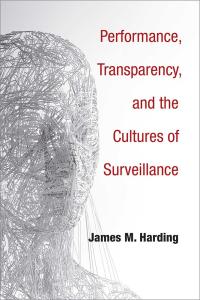
Placing the disciplines of performance studies and surveillance studies in a timely critical dialogue, Performance, Transparency, and the Cultures of Surveillance not only theorizes how surveillance performs but also how the technologies and corresponding cultures of surveillance alter the performance of everyday life. This exploration draws upon a rich array of examples from theatre, performance, and the arts, all of which provide vivid illustration of the book’s central argument: that the rise of the surveillance society coincides with a profound collapse of democratic oversight and transparency—a collapse that, in turn, demands a radical rethinking of how performance practitioners conceptualize art and its political efficacy. The book thus makes the case that artists and critics must reexamine—indeed, must radically redefine—their notions of performance if they are to mount any meaningful counter to the increasingly invasive surveillance society.
Read More about Performance, Transparency, and the Cultures of Surveillance
The Sixties, Center Stage: Mainstream and Popular Performances in a Turbulent Decade
The Sixties, Center Stage offers rich insights into the innovative and provocative political underpinnings of mainstream and popular performances in the 1960s.
Author/Lead: James Harding
While much critical attention has been focused on experimental and radical theater of the period, the essays confirm that mainstream performances not only merit more scholarly attention than they have received, but through serious examination provide an important key to understanding the 1960s as a period.
The introduction provides a broad overview of the social, political, and cultural contexts of artistic practices in mainstream theater from the mid-fifties to mid-seventies. Readers will find detailed examinations of the mainstream’s surprising attention to craft and innovation; to the rich exchange between European and American theatres; to the rise of regional theaters; and finally, to popular cultural performances that pushed the conceptual boundaries of mainstream institutions. The book looks afresh at productions of Hair, Cabaret, Raisin in the Sun, and Fiddler on the Roof, as well as German theater, and performances outside the Democratic National Convention of 1968.
Read More about The Sixties, Center Stage: Mainstream and Popular Performances in a Turbulent Decade
The Ghosts of the Avant-Garde(s): Exorcising Experimental Theater and Performance
The Ghosts of the Avant-Garde(s) explores the diversity and plurality of avant-garde studies.
Author/Lead: James Harding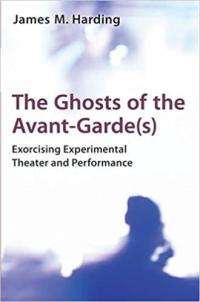
The Ghosts of the Avant-Garde(s) offers a strikingly new perspective on key controversies and debates within avant-garde studies, arguing for the importance of reopening pivotal controversies and debates in avant-garde studies and challenging pronouncements of the “death of the avant-garde” that tend to obscure the diversity and plurality of avant-garde gesture and expression.
James M. Harding revisits iconic sites of early 20th-century performance to examine how European avant-gardists attempted—unsuccessfully—to employ that discourse as a strategy for enforcing uniformity among a politically and culturally diverse group of artists. He then takes aim at historical and aesthetic categories that have promoted a restrictive history and theory of the avant-garde and narrow readings of avant-garde performance. Harding reveals the Eurocentric undercurrents that underlie these categories and urges a consideration of the global political dimensions of avant-garde gestures. His book will interest scholars of theater and performance, art history, and literary studies, as well as those interested in the relation of art to politics in various historical periods and cultures.
Read More about The Ghosts of the Avant-Garde(s): Exorcising Experimental Theater and Performance
Cutting Performances: Collage Events, Feminist Artists, and the American Avant-Garde (Theater: Theory/Text/Performance)
Cutting Performances explores the history of avant-garde performance through a feminist lens.
Author/Lead: James Harding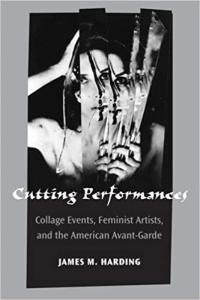
Cutting Performances challenges four decades' worth of scholarship on the American avant-garde by offering a provocative reconceptualization of the history of avant-garde performance along feminist lines. Focusing on five women artists (Elsa von Freytag-Loringhoven, Gertrude Stein, Yoko Ono, Carolee Schneemann, and Valerie Solanas) whose performance aesthetics made prominent use of collage techniques, James M. Harding sheds light on the cultural history of the avant-garde and the role that experimental women artists played in that history. He investigates the prominent position that collage technique occupied within the artists' performance aesthetic, and the decisively feminist inflection that their work gives to collage as a mode of avant-garde expression. The radical juxtapositions in their works produce the powerful effects of making the familiar strange and establishing contexts from which new understandings may emerge.
Harding examines the performative dimensions of collage in experimental, feminist redefinitions of the literary, graphic, and theatrical arts, filling a void in a scholarly discourse that, while ostensibly about the vanguard, has lagged well behind other significant theoretical and historiographical currents. Cutting Performances not only challenges assumptions that have governed scholarship on the American avant-garde but also establishes a context to rethink the history of American avant-garde performance along feminist lines. It will appeal to audiences interested in theater history and performance studies as well as those interested in the cultural history of the avant-garde and the role that feminist experimental artists have played in it.
The Rise of Performance Studies: Rethinking Richard Schechner's Broad Spectrum (Studies in International Performance)
This book co-edited by James Harding and Cindy Rosenthal critically examines Richard Schechner's contributions to the field of performance studies.
Author/Lead: James HardingFew individuals have positioned their work more controversially or consequently than Richard Schechner within the pivotal debates that define Performance Studies. The Rise of Performance Studies is the first collection of essays to critically examine the profound contributions that Schechner has made to Performance Studies as a discipline.
Restaging the Sixties: Radical Theaters and Their Legacies
This edited volume explore the artistry, politics, and legacies of eight radical theatre collectives in the 1960s.
Author/Lead: James Harding
In the volatile period of the late sixties and early seventies, several theater groups came to prominence in the United States, informing and shaping activist theater as we know it today. Restaging the Sixties examines the artistry, politics, and legacies of eight radical collectives: the Living Theatre, the Open Theatre, the Performance Group, the San Francisco Mime Troupe, El Teatro Campesino, At the Foot of the Mountain, the Free Southern Theater, and Bread and Puppet Theater. Each of the specially commissioned essays is from a leading theater artist, critic, or scholar. The essays follow a three-part structure that first provides a historical overview of each group’s work, then an exploration of the group’s significant contributions to political theater, and finally, the legacy of those contributions.
The volume explores how creations such as the Living Theatre's Paradise Now and the Performance Group’s Dionysus in 69 overlapped with political interests that, in the late 1960s, highlighted the notion of social collectives as a radical alternative to mainstream society. Situating theatrical practice within this socio-political context, the book considers how radical theaters sought to redefine the relationship between theater and political activism, and how, as a result, they challenged the foundations of theater itself.
Read More about Restaging the Sixties: Radical Theaters and Their Legacies
Not the Other Avant-Garde: The Transnational Foundations of Avant-Garde Performance (Theater: Theory/Text/Performance)
This edited volume of essays considers avant-garde performance in a global context.
Author/Lead: James HardingThe essays in this collection offer a radical reappraisal of the avant-garde by placing it within a much broader global context. The book questions the very assumptions that underlie the generally accepted chronology and theory of the avant-garde, and offer a bold new performance-based theory that moves beyond Eurocentric presup-positions. In ten essays especially commissioned for this volume, leading scholars and critics including Marvin Carlson, Supito Chatterjee, John Conteh-Morgan, Harry J. Elam, Jr., Joachim Fiebach, David G. Goodman, Jean Graham-Jones, Hanna Higgins, and Adam Versenyi discuss avant-garde performances in Africa, the Middle East, Mexico, Argentina, India, and Japan.
Contours of the Theatrical Avant-Garde: Performance and Textuality (Theater: Theory/Text/Performance)
This collection of essays explores the development of avant-garde theater and its relation to questions of textuality, authority, and the academy.
Author/Lead: James HardingAlthough the canon of modern and contemporary drama would be difficult to imagine without the influential legacy of the movements and strands of the historical avant-garde, this critical history is often overlooked in courses on modern and contemporary drama and theater.
Though primarily focusing on issues of textuality and performance, the essays regard the antitextualism of the avant-garde as indicative of the wide variety of anti-cultural sentiments that have characterized avant-garde performance. The volume begins with the anti-textual sentiments of the avant-garde, then offers antitextual models, explores specific performances, and ends with a critical analysis of the avant-garde. Uniting the array of opinions articulated is a belief that despite the problems that haunt the traditions of avant-garde theater, it can nonetheless offer continued valuable insights into the industries of literature, theater, scholarship, and culture.
Adorno and a Writing of the Ruins: Essays on Modern Aesthetics & Anglo-American Literature and Culture
This book by James Harding extends critical discussion of Adorno to works by Samuel Beckett, T.S. Eliot, Ralph Ellison, and Amiri Baraka, arguing that Adorno's work can best be assessed in terms of its relevance in specific localized contexts.
Author/Lead: James Harding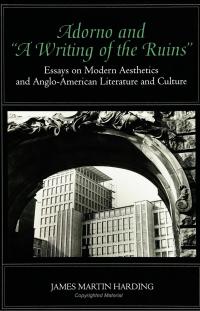
Arguing that postmodernism has so shifted current critical paradigms that Adorno's work can best be assessed in terms of its relevance in specific localized contexts, this book pursues a course that preserves Adorno's opposition to hegemonic programs but that is also wary of Adorno's own (negative) penchant for totalizing concepts. Unlike recent works which attempt to synthesize Adorno's writings into a comprehensive system that then becomes either the focus of an overriding critique or an object of appropriation, Harding orders his book as a collection of essays whose loose association questions the structural totality of Adorno's thought. Though together the essays cover all the major issues of Adorno's thought and offer a wide critical survey of his writings, the diversity of their focus avoids a systematic reduction of Adorno's work into a reproducible technique or method. The result of this strategy is a far more dynamic analysis of Adorno than a mere critical reconstruction of his ideas.
By applying Adorno's theories to works by Samuel Beckett, T.S. Eliot, Ralph Ellison, and Amiri Baraka, the book pushes critical discussion of Adorno into cultural contexts that, while perhaps new for Adorno scholars, reach out to those whose knowledge of Adorno is limited. This book is a fine introduction to the subtleties of Adorno's writing and a genuine contribution to Adorno scholarship.

